To be honest, I couldn’t think of how much I would progressed before I came to Tours. I was crashed by the fact that I couldn’t even speak full sentences when I arrived in the airport. Frustrations grew as my host parents made an obvious effort to understand me as I did to them, yet both attempts failed. Everyday I struggled not to speak in English but people around me always chatted in English. It was so tempting to talk at ease, but I chose to challenge myself to the fullest extent. I would say I talked shamelessly in class: no matter I knew the answer or not, I kept talking (sometimes I didn’t even understand the question). At the beginning, my prof had to stop me from diverting the topics, and I was ashamed by her telling me that “tu n’as pas compris la question.” But I was not discouraged; rather, I was amazed. I perceived the change of me confronting my instincts/the need of self-respect, and forcefully had my brain work in another way. Therefore, at the end of the sixth week, when I was buying the souvenirs for my friends, I could talk with the shopkeepers for hours, and they commented me that my French was “presque normal” (close to normal). It was a undeserved compliment, but I was immensely proud of the progress I had made during these six weeks. As a Chinese student, it was not easy to learn English either. However, I has learnt it for years, so the challenges are very different. And I never pushed myself to such a limit that I once questioned if I was even in madness. Besides language itself, the six-week experience also gave me a deep appreciation of French gastronomy, culture, and the French way of thinking. It was truly like a dream: I lived in France for six weeks, did everything I dreamed to do.
Author: Yuanmeng He
Last Week in Tours
It is my last week in Tours. And I would not call it a good week.
On Tuesday, when my host dad was repairing the wall in the garden, the drill hit something on the other side of the wall and pierced into his left hand. I did not see the whole scene, but when they came back to the house, my host mom was pale. They went to the hospital immediately and my host dad came back quickly with his right hand wrapped in bandages. Therefore, we did not talk much during dinner. However, what I learnt from my host dad was that the health care system in France covers all the cost. I was amazed by the system because it was so different from the ones in the States and in China. My host brother is entering his last year in med school, he told me that the examinations for med school were competitive, and they took a “grand examen” at the end of the school year. He had taken five already, and once he finished with the sixth one, he would work in a hospital depending on his scores. As a med student, he told me the other side of the health care system. When he “fait un stage” (internship in France), he was somehow irritated by those who exploited the system. “People just went in without any problems, they just wanted to ‘waste’ the money of the tax payers, and they did that,” he complained.
On Thursday, my host mom had a liver problem so she went to the hospital for a quick operation, which, of course, costed her nothing. However, she did not have the strength to talk with us, so my host dad jokingly commented that they were both handicapped.
On Friday, it was the final day. When the class ended, I said farewell to all of the classmates, and wished them a bright future. It was a bit sentimental. When I wondered about the town with my friends for the last time, and when my host parents drove me to the train station, knowing that it was probably the last time I could see them, I couldn’t help but cry. Anyway, no matter how enjoyable my summer in Tours was, it had to end. Everything has an end. I have to come back to Notre Dame and continue mon école, but it will stay in my memory forever.
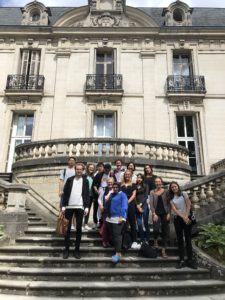
Cultural Excursion: Notre Dame de Paris
Paris, the capital of France, is also the capital of history, arts and literature. I had already written a blog on the national day and the world cup in Paris, but I think it is necessary to write another one specifically for my cultural experience in this city.
- Notre Dame de Paris in general: Bearing the same name as our university, Notre Dame de Paris enjoys its renown as the epitome of gothic cathedrals. I paid the visit of this grandiose architecture when I came to Paris for the first time. Coincidentally, my friend Elaine Chen (Yanlin Chen), who happened to be another SLA recipient, was in Paris at the same weekend. As I got to the entrance of the cathedral, a long queue has already formed. By the entrance, I could already see the flying buttress, and the stained glasses reflecting the rayons of the blinding sunlight. When we got into the cathedral, there was a French mass going on. We weren’t able to comprehend so we chose to walk around and appreciate the beauty of the interior. Besides some little chapels dedicated to various saints, an exhibition on the history of Notre Dame de Paris was held at the ambulatory. The great monument was completed (mostly) in the second half of thirteenth century, and therefore set the standard of a new architectural style—-gothic. However, during the French Revolution, when the poor rallied against emperor and the catholic church, the monument was destroyed as being the symbol of catholicism. In nineteenth century, thanked to the great French writer Vitor Hugo, who was inspired by the decrepitude, who wrote the book Notre Dame de Paris (Hunchback at Notre Dame), bringing the once splendid architecture back to the public attention. Thus, the restoration of the cathedral took place in nineteenth century.
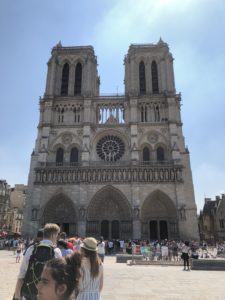
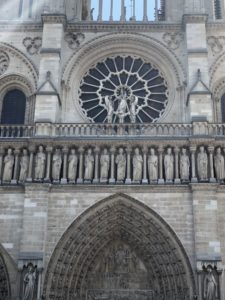
2. Flying Buttress: one of the most outstanding features of gothic cathedral is their flying buttress. Before the gothic period, the romanesque style dominated. Since the romanesque architecture mainly used the walls and the vaults to sustain the whole construction, its wall was immensely thick so as to bear the force of the vaults and ceilings. As a result, the vaults had to be perfectly a semicircle made by wedge-shaped stones, otherwise the distribution of weight would be uneven, and thus leading to the collapse of the vaults. However, the gothic architect invented the flying buttress, which sustain the whole architecture from the outside, allowing the monument reached a greater height. Moreover, the delicate carvings on the flying buttress made it not only practical, but also an important decoration of the architecture as well.
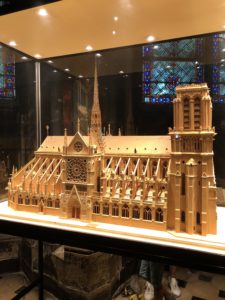
3. Stained Glasses: The stained glass is another creation of the gothic style. Due to the thick walls, the romanesque architectures were not able to apply much decoration on their windows. In fact, they usually had tiny windows. However, flying buttress freed the wall from the burden of sustaining the weight, allowing novel inventions on the windows.
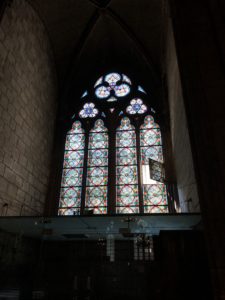
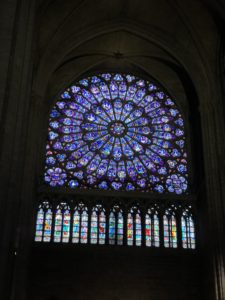
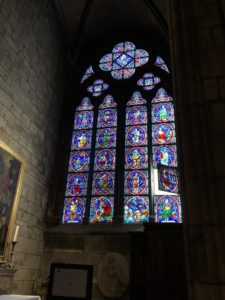
Tours Week 4
It was incredible how quickly the happy hours passed. I had already been in Tours for one month, with only two weeks left! According to the tradition of the institute, we would be reorganized into different classes of different levels once a month. Therefore, this week was my last week with my classmates. Also, since the majority of the students in my class were leaving by the end of the week, we cherished our last week with each other. One of my best friends in the institute was also leaving on Friday afternoon, who didn’t get a chance to visit any chateau at La Loire, so we decided to ride to one of closest chateau—- chateau d’Amboise —- as our last excursion together.
Before I touch on the sentimental side, I will first introduce the beautiful and historically famous Loire Valley. The Loire Valley includes the town in the middle area of the longest river in France, La Loire. The early history of La Loire could be traced back to two thousand BC, when the Gauls first inhabited alongside the river for trades. Also, the valley was once the center of French monarchical rules, where a lot of great chateaus stands out against the sky, showing the once extravagant and glorious life of the French kings. The royal past gave the valley its name “la vallée des rois” (the valley of the kings). Though the French revolution that rallied against monarchy had led to the destruction of several, and the transformation of many into schools and prisons, some of the most grandiose survived with solemnity, spectating the rise and fall of human history.
“Profitez du soleil,” my host parents always told us. That was exactly why we headed out at 1:00 p.m., bearing the dazzling sunlight and 95 degree weather. On our way to Chateau d’Amboise, we first followed the main road; but later, when we saw the trod winding down to the shore of the river, lured by the nature, we abandoned the main road. My friend was an adept rider: within half an hour, she had filled her bucket with wild flowers. We also saw some strawberry farms on our way, but the price of picking the fresh strawberries deterred us. As I wrote in the first line, the happy hours flew quickly—- when we figured out we were in no way near the right path, two hours had gone since we started the journey, long enough for us to reach the chateau by that time. After checking the google map, we decided to totally abandon our plan, and explore more in the little town laying ahead of our unexpected journey. Luckily, though there weren’t many residence in the town, we were able to find a catholic church (since France has a lot of catholics), where a wedding was holding. And then, the time was getting late, and we had to return. On our way back, there were a few vineyards (oh, by the way, the Loire Valley is also known for its wines!) environed by clusters of wild flowers. Unfortunately, the vineyards were closed, but we were able to at least enjoy the scenery.
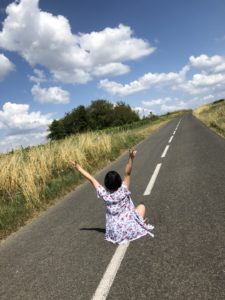
La Gastronomie
France is the country for foodies.
- La bouchée à la reine : la bouchée à la reine is my favorite french dish. When my host parents had to leave for a soirée and couldn’t dine with us, my host mom made us la bouchée à la reine. The word “bouchée” originally refers to the kind of pastry with sweet filling. However, la bouchée à la reine is rather savory. With the modifier “à la reine”, the bouchée was indeed created by a queen——Marie Leszczynska, the queen of Louise XV——to regain the favor of her husband. La bouchée à la reine consists of pâte feuilletée (puff pastry) on the outside and a mixture of mushrooms cubes, savory chicken fillets and a kind of creme on the inside. Though it had been a while since I ate them, the taste of the combination of the crunchy outside and the soft, buttery inside still lingers in my head.

Four bouchée à la rein! Enough for 2 people. As a foodie, I asked for “une petite Dégustation” in class one day, and my prof agreed that it would be good to have everyone bring their favorite french desserts and share with the others. Since we didn’t plot on the degustation, four of us brought the tarts, though of different flavors, and three of us brought “éclair.” Therefore, I am going to briefly introduce these two most popular french desserts in my class.
- Les tartes aux fruits: the fruit tarts were the definitely the stars of the degustation. Basing on a pastry base, the fruit tarts are open to variations on the top, including strawberries, lemon, and the “fruits” in general. To be honest, I thought the pastry base was so hard that I almost hurt my teeth, so I didn’t really taste every flavors.
- Éclairs: éclair is by far my favorite french dessert. My prof told me that the éclairs were originally only “au chocolat” or “au café”; but later on, since people wanted to expand the scope of this beloved desserts, they experimented on the other toppings, including vanilla, lemons and even strawberries. Technically speaking, éclairs are not hard to make: my host mom said they were just pâte à choux with cream inside and chocolate toppings (she was talking about éclairs au chocolat”). However, it tastes so good that it was given the name “éclair,” originally referring to “lightening,” meaning that it was eaten as fast as the lightening.
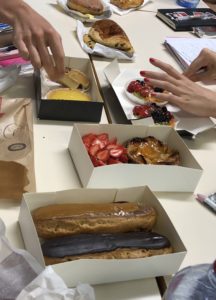
4. Le petit déjeuner (breakfast): the typical french breakfast includes: tartine, baguette slices with butter and jams; viennoiserie ( croissant, pain au chocolate, pain au raisin); boisson (espresso, cafe au lait, chocolat chaude, thé, jus d’orange presse/pamplemousse presse). As for me, I had the tartine every morning. The way French people carrying baguettes around is very cool too. On every morning, I saw my host mom took out the baguette from her bag, even without a wrapping, and cut the the baguette into slices, and then put it back to her bag. Sometimes on the tram, I saw kids fighting with each other with baguette as swords, without a wrapping either.
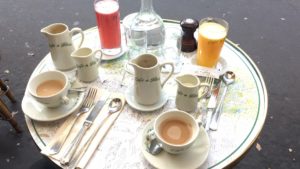
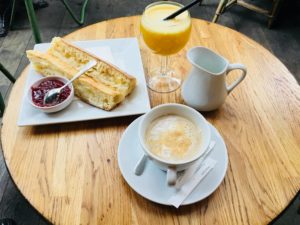
J’ai eu la chance: La fête nationale et La coupe du monde, tous dans le deuxième weekend.
“Paris est une fête.” —- Ernest Hemingway.
Though I knew nothing of soccer, I knew that the french team advanced to the semifinal. My host dad said “tu as la chance” (you have the chance) since French people weren’t very passionate (as germans) about the world cup until they saw the possibility of actually winning it. It was just my second week in Tours and I was able to see the nationalism of French people, which manifested rarely. On Tuesday, it was France playing against Belgium. In the early afternoon, people dressing up in the color of France ( blue, white and red 🇫🇷), started to march down the major road in Tours——la rue nationale. Sharp at 6:45, I headed out with another student in the house; Tours was not a large city, so when we got to the “Place Plum,” it was almost 7:00 p.m., but the placed had already been filled by people. Arriving one hour before the game started, we were able to find a good spot to sit on the road and not be trampled by the passer-bys. When the game started, all the roads were blocked by people, and when we wanted to go stand up and buy some food during the game, désolée, we had to step on people. Due to my ignorance of the soccer players and the rules, all I knew was “on est en finale” (France advanced in the final round).
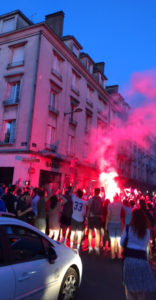
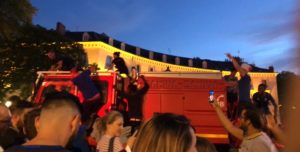
At lunch table, as I heard my host parents discuss over “le feu d’artifice à la Tour Eiffel,” I suddenly realized “j’ai eu la chance” : how could there be a better way to spend my weekend than celebrating la fête nationale (July 14) by watching the fireworks at the Eiffel tower on Saturday night, and cheering for the victory of French national football team on Sunday? It was a spur of moment thing, but I bought the train ticket to Paris right away.
Before “le feu d’artifice,” it was a classical concerts with a lot of renown French musicians and orchestras. Though the roads were entirely blocked by people, picnicking with my Chinese friends in front of the Eiffel tower was still refreshing. Immersed myself entirely in French (with the depart of Ana, I made friends with people who only spoke French), I all of a sudden figured out how easy it was to talk without conjugations, placing objects before verbs and making accordance of tenses. We waited for three hours until the clock finally hit 11. The party started. The theme of the year was “Amour” (Love). Starting with Carmen, the firework at the Eiffel tower was truly an incredible scene to look at. I’ll let the pictures speak of itself.



Right on the next afternoon, the world cup final started. After a short visit of la maison de Victor Hugo (the house of Victor Hugo), I went into a bar at Bastille. People had already started chanting Marseille with exuberance two hours before the final. As we all knew, the french team won the world cup, so the french people ran lunatics: people screaming in the streets, dancing on the cars, jumping in la seine etc. It was fun to watch all those clam and elegant Parisians go wild out of ecstasy.
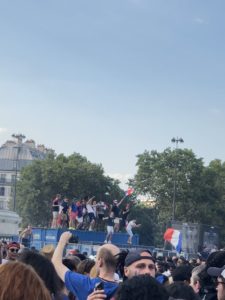
On my way back to Tours, I reflected on all the coincidence that led up to this incredible weekend: j’ai eu la chance to receive the SLA grants, arrive in France when the French team winning the four-year-a-time world cup, the national day happens to be the day before France won the world cup.
Tours Week 1
When I arrived in France, it welcomed me with rail strikes, about which I had received several traveling alerts. Due to “La grève SNCF” (société nationale des chemins de fer français), the two-hour train from the airport to Gare de Tours was prolonged to four hours, raising the cost to 70 euros. On the train to Tours, at first the announcement was in both French and English; but soon, it was only in French, which was incomprehensible to me at that point (though I took French for one year, the crew spoke too fast and the liaison made the announcement hard to understand). Therefore, when I transferred in a little town in southern France, I was not able to confirm whether I took the right train heading to Tours or I got on the the wrong one taking me to some placesunknown to me. Luckily, I arrived in the Gare at 5:35p.m. and my host family had already waited me there for half an hour. Before I actually lived with a French family, I thought taking the intensive courses for a year would have prepared me well at least for the daily conversation. However, when I actually facing my gentle host parents, I found myself deaf and mute. With fatigues and frustrations, I didn’t get jet lag on first night in France, but I was worried for the classes starting on the next day.
On the second day of school, I met Ana, my classmate at Notre Dame, who had been in Tours for seven weeks. Since she knew everything well in the city and the institut, I profited from her familiarity—-on the second day of school, also my third day in France, I went to La Guinguette, the bar by La Loire. It was actually chill; all we did was sitting by the shore and talking in French (though I listened and pretended I understand most of the time).
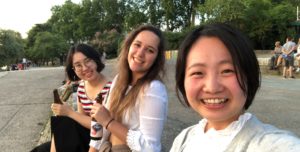
Thanks to Ana, I also befriended with a Japanese girl named “Kae” from the institute (the girl who held the camera in the picture above). It was probably due to the popularity of L’institut de Touraine in north america, I arrived with some more than a hundred english speakers from Canada and US. It was not a huge institute, so the students there were predominantly english speakers, and it was so easy to just hang out with the Americans but one did not come to France to speak English. Therefore, when I befriended with Kae, who couldn’t speak English at all, I was forced to speak French all the time (not really, sometimes people in my class talked in English), which was a great exercise for me. If I chatted with an English speaker in French, I could easily use a english word hidden in French accent (since english and french share their words), and he/she would understand, but it wasn’t because I knew the correct word in french, but because he/she knew that english word. So when I talked to a non-English speaker, I had to find another way to explicate, and there was no switch between english and french.
My first week had gone fast: I just got over the jet lag, made some new friends and that’s it!